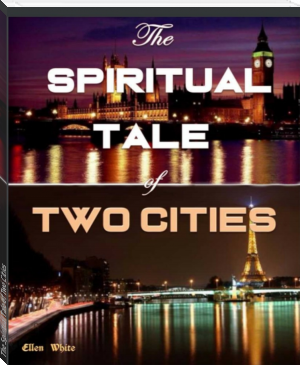The Spiritual Tale of Two Cities, Ellen G. White [readict books .TXT] 📗

- Author: Ellen G. White
Book online «The Spiritual Tale of Two Cities, Ellen G. White [readict books .TXT] 📗». Author Ellen G. White
For a thousand years, Satan will wander to and fro in the desolate earth to behold the results of his rebellion against the law of God. During this time his sufferings are intense. Since his fall his life of unceasing activity has banished reflection; but he is now deprived of his power and left to contemplate the part which he has acted since first he rebelled against the government of heaven, and to look forward with trembling and terror to the dreadful future when he must suffer for all the evil that he has done and be punished for the sins that he has caused to be committed.
To God's people the captivity of Satan will bring gladness and rejoicing. Says the prophet: "It shall come to pass in the day that Jehovah shall give thee rest from thy sorrow, and from thy trouble, and from the hard service wherein thou wast made to serve, that thou shalt take up this parable against the king of Babylon [here representing Satan], and say, How hath the oppressor ceased! . . . Jehovah hath broken the staff of the wicked, the sceptre of the rulers; that smote the peoples in wrath with a continual stroke, that ruled the nations in anger, with a persecution that none restrained." Verses 36, R.V.
During the thousand years between the first and the second resurrection the judgment of the wicked takes place. The apostle Paul points to this judgment as an event that follows the second advent. "Judge nothing before the time, until the Lord come, who both will bring to light the hidden things of darkness, and will make manifest the counsels of the hearts." 1 Corinthians 4:5. Daniel declares that when the Ancient of Days came, "judgment was given to the saints of the Most High." Daniel 7:22. At this time the righteous reign as kings and priests unto God. John in the Revelation says: "I saw thrones, and they sat upon them, and judgment was given unto them." "They shall be priests of God and of Christ, and shall reign with Him a thousand years." Revelation 20:4, 6. It is at this time that, as foretold by Paul, "the saints shall judge the world." 1 Corinthians 6:2. In union with Christ they judge the wicked, comparing their acts with the statute book, the Bible, and deciding every case according to the deeds done in the body. Then the portion which the wicked must suffer is meted out, according to their works; and it is recorded against their names in the book of death.
Satan also and evil angels are judged by Christ and His people. Says Paul: "Know ye not that we shall judge angels?" Verse 3. And Jude declares that "the angels which kept not their first estate, but left their own habitation, He hath reserved in everlasting chains under darkness unto the judgment of the great day." Jude 6. At the close of the thousand years the second resurrection will take place. Then the wicked will be raised from the dead and appear before God for the execution of "the judgment written." Thus the revelator, after describing the resurrection of the righteous, says: "The rest of the dead lived not again until the thousand years were finished." Revelation 20:5. And Isaiah declares, concerning the wicked: "They shall be gathered together, as prisoners are gathered in the pit, and shall be shut up in the prison, and after many days shall they be visited." Isaiah 24:22.

At the close of the thousand years, Christ again returns to the earth. He is accompanied by the host of the redeemed and attended by a retinue of angels. As He descends in terrific majesty He bids the wicked dead arise to receive their doom. They come forth, a mighty host, numberless as the sands of the sea. What a contrast to those who were raised at the first resurrection! The righteous were clothed with immortal youth and beauty. The wicked bear the traces of disease and death. Every eye in that vast multitude is turned to behold the glory of the Son of God. With one voice the wicked hosts exclaim: "Blessed is He that cometh in the name of the Lord!" It is not love to Jesus that inspires this utterance. The force of truth urges the words from unwilling lips. As the wicked went into their graves, so they come forth with the same enmity to Christ and the same spirit of rebellion. They are to have no new probation in which to remedy the defects of their past lives. Nothing would be gained by this. A lifetime of transgression has not softened their hearts. A second probation, were it given them, would be occupied as was the first in evading the requirements of God and exciting rebellion against Him.
Christ descends upon the Mount of Olives, whence, after His resurrection, He ascended, and where angels repeated the promise of His return. Says the prophet: "The Lord my God shall come, and all the saints with Thee." "And His feet shall stand in that day upon the Mount of Olives, which is before Jerusalem on the east, and the Mount of Olives shall cleave in the midst thereof, . . . and there shall be a very great valley." "And the Lord shall be king over all the earth: in that day shall there be one Lord, and His name one." Zechariah 14:5, 4, 9. As the New Jerusalem, in its dazzling splendour, comes down out of heaven, it rests upon the place purified and made ready to receive it, and Christ, with His people and the angels, enters the Holy City.
Now Satan prepares for a last mighty struggle for the supremacy. While deprived of his power and cut off from his work of deception, the prince of evil was miserable and dejected; but as the wicked dead are raised and he sees the vast multitudes upon his side, his hopes revive, and he determines not to yield the great controversy. He will marshal all the armies of the lost under his banner and through them endeavour to execute his plans. The wicked are Satan's captives. In rejecting Christ they have accepted the rule of the rebel leader. They are ready to receive his suggestions and to do his bidding. Yet, true to his early cunning, he does not acknowledge himself to be Satan. He claims to be the prince who is the rightful owner of the world and whose inheritance has been unlawfully wrested from him. He represents himself to his deluded subjects as a redeemer, assuring them that his power has brought them forth from their graves and that he is about to rescue them from the most cruel tyranny. The presence of Christ having been removed, Satan works wonders to support his claims. He makes the weak strong and inspires all with his own spirit and energy. He proposes to lead them against the camp of the saints and to take possession of the City of God. With fiendish exultation he points to the unnumbered millions who have been raised from the dead and declares that as their leader he is well able to overthrow the city and regain his throne and his kingdom.
In that vast throng are multitudes of the long-lived race that existed before the Flood; men of lofty stature and giant intellect, who, yielding to the control of fallen angels, devoted all their skill and knowledge to the exaltation of themselves; men whose wonderful works of art led the world to idolise their genius, but whose cruelty and evil inventions, defiling the earth and defacing the image of God, caused Him to blot them from the face of His creation. There are kings and generals who conquered nations, valiant men who never lost a battle, proud, ambitious warriors whose approach made kingdoms tremble. In death these experienced no change. As they come up from the grave, they resume the current of their thoughts just where it ceased. They are actuated by the same desire to conquer that ruled them when they fell.
Satan consults with his angels, and then with these kings and conquerors and mighty men. They look upon the strength and numbers on their side, and declare that the army within the city is small in comparison with theirs, and that it can be overcome. They lay their plans to take possession of the riches and glory of the New Jerusalem. All immediately begin to prepare for battle. Skillful artisans construct implements of war. Military leaders, famed for their success, marshal the throngs of warlike men into companies and divisions. At last the order to advance is given, and the countless host moves on--an army such as was never summoned by earthly conquerors, such as the combined forces of all ages since war began on earth could never equal. Satan, the mightiest of warriors, leads the van, and his angels unite their forces for this final struggle. Kings and warriors are in his train, and the multitudes follow in vast companies, each under its appointed leader. With military precision the serried ranks advance over the earth's broken and uneven surface to the City of God. By command of Jesus, the gates of the New Jerusalem are closed, and the armies of Satan surround the city and make ready for the onset. Now Christ again appears to the view of His enemies. Far above the city, upon a foundation of burnished gold, is a throne, high and lifted up. Upon this throne sits the Son of God, and around Him are the subjects of His kingdom. The power and majesty of Christ no language can describe, no pen portray. The glory of the Eternal Father is enshrouding His Son. The brightness of His presence fills the City of God, and flows out beyond the gates, flooding the whole earth with its radiance.
Nearest the throne are those who were once zealous in the cause of Satan, but who, plucked as brands from the burning, have followed their Saviour with deep, intense devotion. Next are those who perfected Christian characters in the midst of falsehood and infidelity, those who honoured the law of God when the Christian world declared it void, and the millions, of all ages, who were martyred for their faith. And beyond is the "great multitude, which no man could number, of all nations, and kindreds, and people, and tongues, . . . before the throne, and before the Lamb, clothed with white robes, and palms in their hands." Revelation 7:9. Their warfare is ended, their victory won. They have run the race and reached the prize. The palm branch in their hands is a symbol of their triumph, the white robe an emblem of the spotless righteousness of Christ which now is theirs.
The redeemed raise a song of praise that echoes and re-echoes through the vaults of heaven: "Salvation to our God which sitteth upon the throne, and unto the Lamb." Verse 10. And angel and seraph unite their voices in adoration. As the redeemed have beheld the power and malignity of Satan, they have seen, as never before, that no power but that of Christ could have made them conquerors. In all that shining throng there are none to ascribe salvation to themselves, as if they had prevailed by their own power and goodness. Nothing is said of what they have done or suffered; but the burden of every song,





Comments (0)